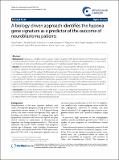A biology-driven approach identifies the hypoxia gene signature as a predictor of the outcome of neuroblastoma patients
Author(s)
Fardin, Paolo; Barla, Annalisa; Mosci, Sofia; Rosasco, Lorenzo Andrea; Verri, Alessandro; Versteeg, Rogier; Caron, Huib N.; Molenaar, Jan J.; Ora, Ingrid; Eva, Alessandra; Puppo, Maura; Varesio, Luigi; ... Show more Show less
DownloadFardin-2010-A biology-driven approach identifies the hypoxia gene signature as a predictor of the outcome of neuroblastoma patients.pdf (1.344Mb)
PUBLISHER_CC
Publisher with Creative Commons License
Creative Commons Attribution
Terms of use
Metadata
Show full item recordAbstract
Background
Hypoxia is a condition of low oxygen tension occurring in the tumor microenvironment and it is related to poor prognosis in human cancer. To examine the relationship between hypoxia and neuroblastoma, we generated and tested an in vitro derived hypoxia gene signature for its ability to predict patients' outcome.
Results
We obtained the gene expression profile of 11 hypoxic neuroblastoma cell lines and we derived a robust 62 probesets signature (NB-hypo) taking advantage of the strong discriminating power of the l1-l2 feature selection technique combined with the analysis of differential gene expression. We profiled gene expression of the tumors of 88 neuroblastoma patients and divided them according to the NB-hypo expression values by K-means clustering. The NB-hypo successfully stratifies the neuroblastoma patients into good and poor prognosis groups. Multivariate Cox analysis revealed that the NB-hypo is a significant independent predictor after controlling for commonly used risk factors including the amplification of MYCN oncogene. NB-hypo increases the resolution of the MYCN stratification by dividing patients with MYCN not amplified tumors in good and poor outcome suggesting that hypoxia is associated with the aggressiveness of neuroblastoma tumor independently from MYCN amplification.
Conclusions
Our results demonstrate that the NB-hypo is a novel and independent prognostic factor for neuroblastoma and support the view that hypoxia is negatively correlated with tumors' outcome. We show the power of the biology-driven approach in defining hypoxia as a critical molecular program in neuroblastoma and the potential for improvement in the current criteria for risk stratification.
Date issued
2010-07Department
Massachusetts Institute of Technology. Center for Biological & Computational Learning; Massachusetts Institute of Technology. Department of Brain and Cognitive Sciences; McGovern Institute for Brain Research at MITJournal
Molecular Cancer
Publisher
BioMed Central Ltd.
Citation
Fardin, Paolo et al. “A Biology-driven Approach Identifies the Hypoxia Gene Signature as a Predictor of the Outcome of Neuroblastoma Patients.” Molecular Cancer 9.1 (2010): 185.
Version: Final published version
ISSN
1476-4598